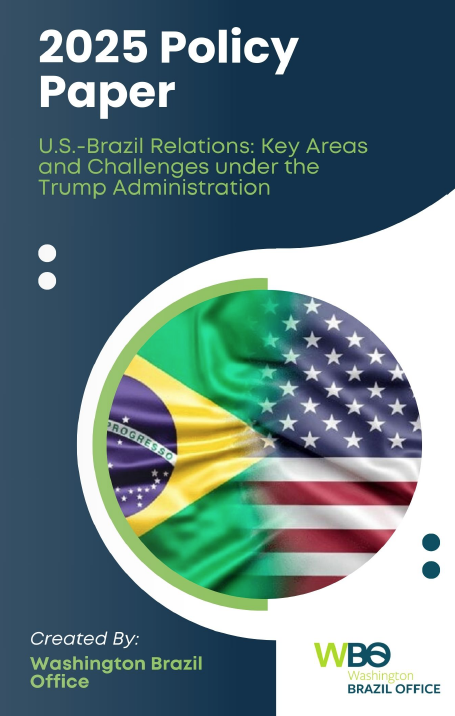
U.S.-BRAZIL RELATIONS: KEY AREAS AND CHALLENGES
This policy paper is the result of a collaborative effort driven by a dedicated group of individuals whose expertise and commitment have greatly enhanced its content. We would like to extend special thanks to the following individuals for their invaluable contributions:
• André Pagliarini: “A Brief Retrospective of U.S.-Brazil Relations in Recent Years” • Tracy Devine-Guzmán: “Environment and Sustainable Development”
• Guilherme Casarões: “Global Governance”
• Álvaro Lima: “Immigration Issues”
• Kellie Meiman Hock: “Trade and Economic Relations”
• Rafael Ioris: “Recommendations and Prospects for U.S.-Brazil Relations in a Changing World”
Your insights, research, and support have been crucial in shaping the comprehensive analysis presented in this paper.
This document stands as a collective achievement, and we are deeply grateful for the passion, expertise, and collaborative spirit of everyone involved. Without your exceptional contributions, this endeavor would not have been possible.
The 2025 Policy Paper, published by the Washington Brasil Office (WBO), serves as a critical instrument for analyzing and guiding the evolving relationship between the United States and Brazil under the new political dynamics emerging from recent leadership changes. As global governance structures shift and international alliances are tested, it becomes increasingly necessary to assess the impact of these transformations on bilateral cooperation, economic exchanges, democracy, human rights, and environmental policies. This paper provides an in-depth evaluation of key areas shaping U.S.-Brazil relations and offers actionable recommendations to strengthen diplomatic and strategic engagement between the two nations.
The primary objective of this policy paper is to present a structured analysis of the challenges and opportunities arising from the return of Donald Trump to the U.S. presidency and its implications for Brazil’s domestic and foreign policy landscape. By examining the effects of these changes on democracy, trade, immigration, environmental policies, and multilateralism, the document aims to inform policymakers, civil society organizations, academic institutions, and the broader public about the strategic considerations that should guide U.S.-Brazil relations in the coming years.
Additionally, the policy paper underscores the importance of maintaining and expanding bilateral cooperation amidst shifting geopolitical tensions. Brazil’s increasing diplomatic role in global governance forums such as the G20 and BRICS presents both opportunities and challenges for engagement with the United States. As Brazil seeks to balance its relations with the United States and other global powers, this document emphasizes the importance of pragmatic and constructive dialogue to ensure that mutual interests, particularly in democratic resilience, sustainable development, and human rights protection, remain at the forefront of bilateral discussions.
To access the Policy Paper, click this LINK:
The Washington Brazil Office (WBO) is an independent institution that specializes in analyzing Brazil and supporting actions that strengthen the role of civil society and institutions dedicated to promoting and defending democracy, human rights, freedoms, and sustainable socioeconomic and environmental development in the country.
Their objective is to produce knowledge and support the international work of all sectors that require assistance, action, bilateral exchanges, knowledge production, and the establishment of cooperative relations between Brazil, the United States, and international organizations and bodies headquartered in the United States.
Brasileiros na América Central
BRASILEIROS NA AMÉRICA CENTRAL "Lorem ipsum dolor sit amet, consectetur adipiscing elit, sed do eiusmod tempor incididunt ut labore et dolore magna aliqua. Ut enim ad minim veniam, quis nostrud exercitation ullamco laboris nisi ut aliquip ex ea commodo consequat. Duis...
Brazilian Emigration to North America – Bibliography
Albues, Teresa
1995 O Berro de Cordeiro em Nova York. Rio de Janeiro: Civilização Brasileira…
Brasileiros no Oriente Médio
As populações de brasileiros no Oriente Médio são bastante pequenas e concentradas em poucos países. Israel, com 20.000 brasileiros e o Líbano com 5.000 representam respectivamente (62,7%) e (15,7%) da população brasileira do Oriente Médio. …
Neoliberalismo e Trabalho Imigrante
Neoliberalismo e Trabalho ImigranteSérie de seis seminários sobre Neoliberalismo e o Trabalho Imigrante terá aula bônus disponível a partir do dia 17/01. As inscrições estão abertas até o dia 20 de janeiro. Quem se inscrever após o dia 17 terá acesso ao conteúdo...
Eleições Presidenciais Brasileiras no Exterior (1989 – 2022)
A participação dos emigrantes no processo político dos seus países de origem, seja pelo exercício do voto ou pela capacidade de concorrer a cargos eletivos, é expressão do aumento significativo da migração internacional e das crescentes atividades transnacionais destes emigrantes.
O livro Ausente & Presente: O Voto…
Visualizing the Brazilian Diaspora in the U.S.
This project was developed in partnership with Boston University’s Spark Lab. The Spark Lab is a technology incubator and experimental learning lab for student-led computational and data driven projects at Boston University.
As part of the CS 506 class, students Junhe Chen, Haoyu Zhang, and Hui Li, under…

